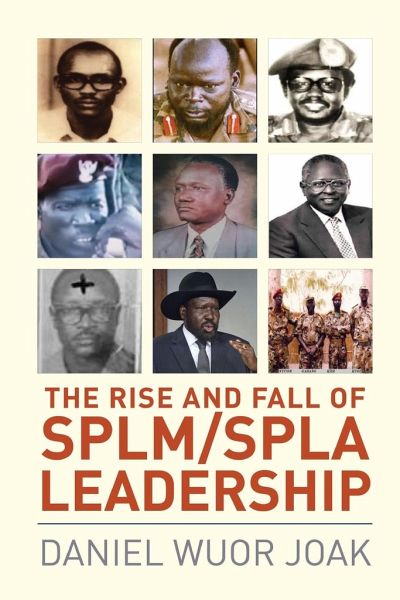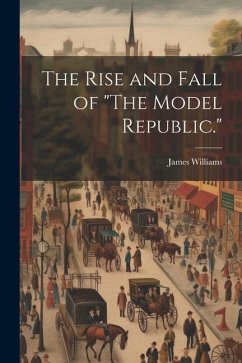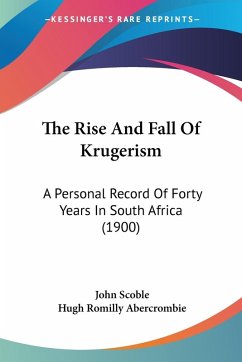
The Rise and Fall of SPLM/SPLA Leadership
Versandkostenfrei!
Versandfertig in 1-2 Wochen
23,99 €
inkl. MwSt.

PAYBACK Punkte
12 °P sammeln!
The Rise and Fall of SPLM/SPLA Leadership provides lively and descriptive narratives of key leaders of the South Sudanese revolutions, with special attention to the debates and issues that make South Sudan’s history relevant to both contemporary South Sudanese and wider audiences. Author Daniel Wuor Joak, an influential South Sudanese politician, illuminates the historical significances of South Sudan’s social, political, and economic affairs within the wider context of Sudan—an extraordinary achievement, given the multiplicity of peoples and regions and the complexity of tribal rivalrie...
The Rise and Fall of SPLM/SPLA Leadership provides lively and descriptive narratives of key leaders of the South Sudanese revolutions, with special attention to the debates and issues that make South Sudan’s history relevant to both contemporary South Sudanese and wider audiences. Author Daniel Wuor Joak, an influential South Sudanese politician, illuminates the historical significances of South Sudan’s social, political, and economic affairs within the wider context of Sudan—an extraordinary achievement, given the multiplicity of peoples and regions and the complexity of tribal rivalries within the country. The title of this book refers to the nine founding members of the Sudanese People’s Liberation Movement and its army. Their rise and fall should serve as a reminder of the shortcomings of the leaders who planted the seeds of disharmony from the onset of the struggle for South Sudanese independence. With its freedom won on July 9, 2011, South Sudan’s people know the stakes are high, should this nascent nation fail to manage its own affairs responsibly. For this reason, the issues that damaged the liberation movement need to be understood and resolved by members of all sixty-four united tribes to avoid lapsing back into an oppressed state. The Rise and Fall of SPLM/SPLA Leadership provides lively and descriptive narratives of key leaders of the South Sudanese revolutions, with special attention to the debates and issues that make South Sudan’s history relevant to both contemporary South Sudanese and wider audiences. Author Daniel Wuor Joak, an influential South Sudanese politician, illuminates the historical significances of South Sudan’s social, political, and economic affairs within the wider context of Sudan—an extraordinary achievement, given the multiplicity of peoples and regions and the complexity of tribal rivalries within the country. The title of this book refers to the nine founding members of the Sudanese People’s Liberation Movement and its army. Their rise and fall should serve as a reminder of the shortcomings of the leaders who planted the seeds of disharmony from the onset of the struggle for South Sudanese independence. With its freedom won on July 9, 2011, South Sudan’s people know the stakes are high, should this nascent nation fail to manage its own affairs responsibly. For this reason, the issues that damaged the liberation movement need to be understood and resolved by members of all sixty-four united tribes to avoid lapsing back into an oppressed state. The Rise and Fall of SPLM/SPLA Leadership provides lively and descriptive narratives of key leaders of the South Sudanese revolutions, with special attention to the debates and issues that make South Sudan’s history relevant to both contemporary South Sudanese and wider audiences. Author Daniel Wuor Joak, an influential South Sudanese politician, illuminates the historical significances of South Sudan’s social, political, and economic affairs within the wider context of Sudan—an extraordinary achievement, given the multiplicity of peoples and regions and the complexity of tribal rivalries within the country. The title of this book refers to the nine founding members of the Sudanese People’s Liberation Movement and its army. Their rise and fall should serve as a reminder of the shortcomings of the leaders who planted the seeds of disharmony from the onset of the struggle for South Sudanese independence. With its freedom won on July 9, 2011, South Sudan’s people know the stakes are high, should this nascent nation fail to manage its own affairs responsibly. For this reason, the issues that damaged the liberation movement need to be understood and resolved by members of all sixty-four united tribes to avoid lapsing back into an oppressed state.














